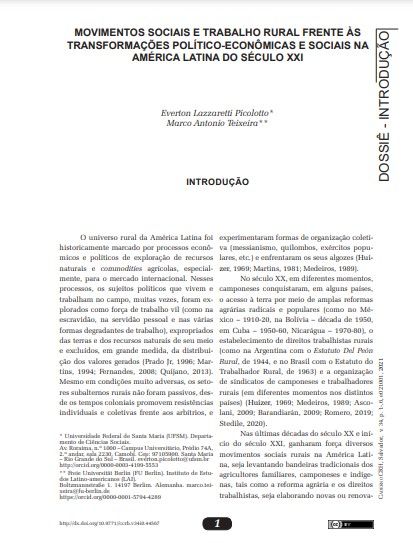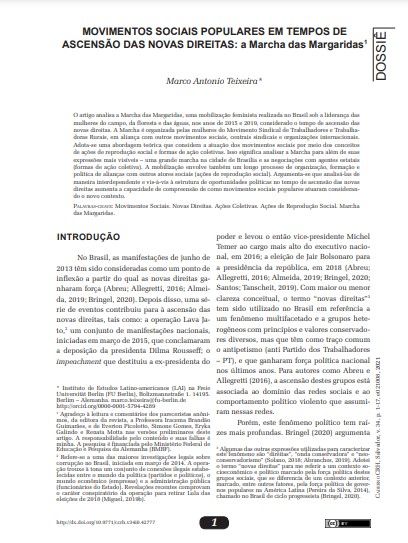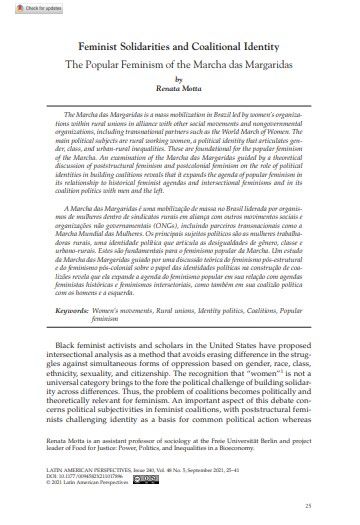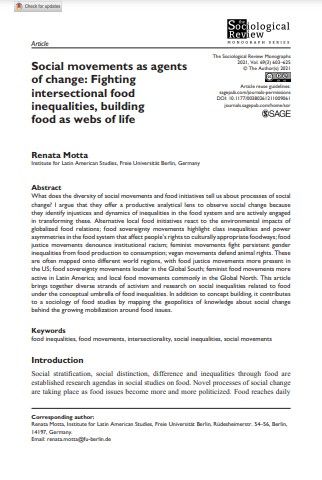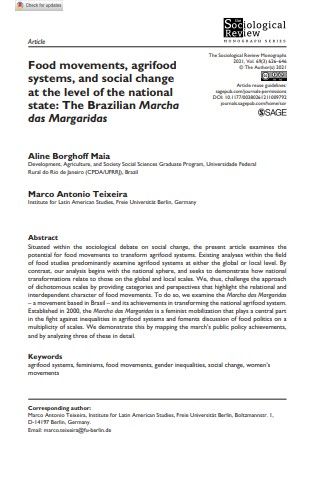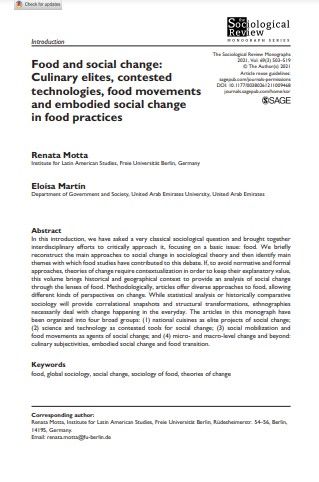Caderno CRH • 2021
Movimentos sociais e trabalho rural frente às transformações político-econômicas e sociais na América Latina do séc. XXI
Caderno CRH • 2021
Movimentos populares em tempos de ascensão das novas direitas: a Marcha das Margaridas
Abstrato
O artigo analisa a Marcha das Margaridas, uma mobilização feminista realizada no Brasil sob a liderança das mulheres do campo, da floresta e das águas, nos anos de 2015 e 2019, considerado o tempo de ascensão das novas direitas. A Marcha é organizada pelas mulheres do Movimento Sindical de Trabalhadores e Trabalhadoras Rurais, em aliança com outros movimentos sociais, centrais sindicais e organizações internacionais. Adota-se uma abordagem teórica que considera a atuação dos movimentos sociais por meio dos conceitos de ações de reprodução social e formas de ação coletivas. Isso significa analisar a Marcha para além de suas expressões mais visíveis – uma grande marcha na cidade de Brasília e as negociações com agentes estatais (formas de ação coletiva). A mobilização envolve também um longo processo de organização, formação e política de alianças com outros atores sociais (ações de reprodução social). Argumenta-se que analisá-las de maneira interdependente e vis-à-vis à estrutura de oportunidades políticas no tempo de ascensão das novas direitas aumenta a capacidade de compreensão de como movimentos sociais populares atuaram considerando o novo contexto.
This article analyses the Marcha das Margaridas , a feminist mobilisation spearheaded by women from the Brazilian Union of Rural Workers in alliance with other social movements, trade unions, and international organisations in the years 2015 and 2019 – considered to be the time of the rise of the new right. From a theoretical approach that regard the performance of social movements based on the concepts of actions of social reproduction and forms of collective action, we analyse the Marcha beyond its most visible expression – that is, a large street protest in the city of Brasilia, and the negotiations with state agents (forms of collective action). Rather, we understand this movement as also involving a long process of organisation, mobilisation, political formation activities, and politics of alliances with other social actors (actions of social reproduction). By analysing them interdependently and vis-à-vis the political opportunity structures at the time of the rise of the new right, we will better understand how social movements acted considering the new context.
Latin American Perspectives • 2021
Feminist Solidarities and Coalitional Identity: The Popular Feminism of the Marcha das Margaridas
Abstrato
The Marcha das Margaridas is a mass mobilization in Brazil led by women’s organizations within rural unions in alliance with other social movements and nongovernmental organizations, including transnational partners such as the World March of Women. The main political subjects are rural working women, a political identity that articulates gender, class, and urban-rural inequalities. These are foundational for the popular feminism of the Marcha. An examination of the Marcha das Margaridas guided by a theoretical discussion of poststructural feminism and postcolonial feminism on the role of political identities in building coalitions reveals that it expands the agenda of popular feminism in its relationship to historical feminist agendas and intersectional feminisms and in its coalition politics with men and the left.
The Sociological Review • 2021
Social movements as agents of change: Fighting intersectional food inequalities, building food as webs of life
Abstrato
What does the diversity of social movements and food initiatives tell us about processes of social change? I argue that they offer a productive analytical lens to observe social change because they identify injustices and dynamics of inequalities in the food system and are actively engaged in transforming these. Alternative local food initiatives react to the environmental impacts of globalized food relations; food sovereignty movements highlight class inequalities and power asymmetries in the food system that affect people’s rights to culturally appropriate foodways; food justice movements denounce institutional racism; feminist movements fight persistent gender inequalities from food production to consumption; vegan movements defend animal rights. These are often mapped onto different world regions, with food justice movements more present in the US; food sovereignty movements louder in the Global South; feminist food movements more active in Latin America; and local food movements commonly in the Global North. This article brings together diverse strands of activism and research on social inequalities related to food under the conceptual umbrella of food inequalities. In addition to concept building, it contributes to a sociology of food studies by mapping the geopolitics of knowledge about social change behind the growing mobilization around food issues.
The Sociological Review • 2021
Food movements, agrifood systems, and social change at the level of the national state: The Brazilian Marcha das Margaridas
The Sociological Review • 2021
Food and social change: Culinary elites, contested technologies, food movements and embodied social change in food practices
Abstrato
In this introduction, we have asked a very classical sociological question and brought together interdisciplinary efforts to critically approach it, focusing on a basic issue: food. We briefly reconstruct the main approaches to social change in sociological theory and then identify main themes with which food studies have contributed to this debate. If, to avoid normative and formal approaches, theories of change require contextualization in order to keep their explanatory value, this volume brings historical and geographical context to provide an analysis of social change through the lenses of food. Methodologically, articles offer diverse approaches to food, allowing different kinds of perspectives on change. While statistical analysis or historically comparative sociology will provide correlational snapshots and structural transformations, ethnographies necessarily deal with change happening in the everyday. The articles in this monograph have been organized into four broad groups: (1) national cuisines as elite projects of social change; (2) science and technology as contested tools for social change; (3) social mobilization and food movements as agents of social change; and (4) micro- and macro-level change and beyond: culinary subjectivities, embodied social change and food transition.





